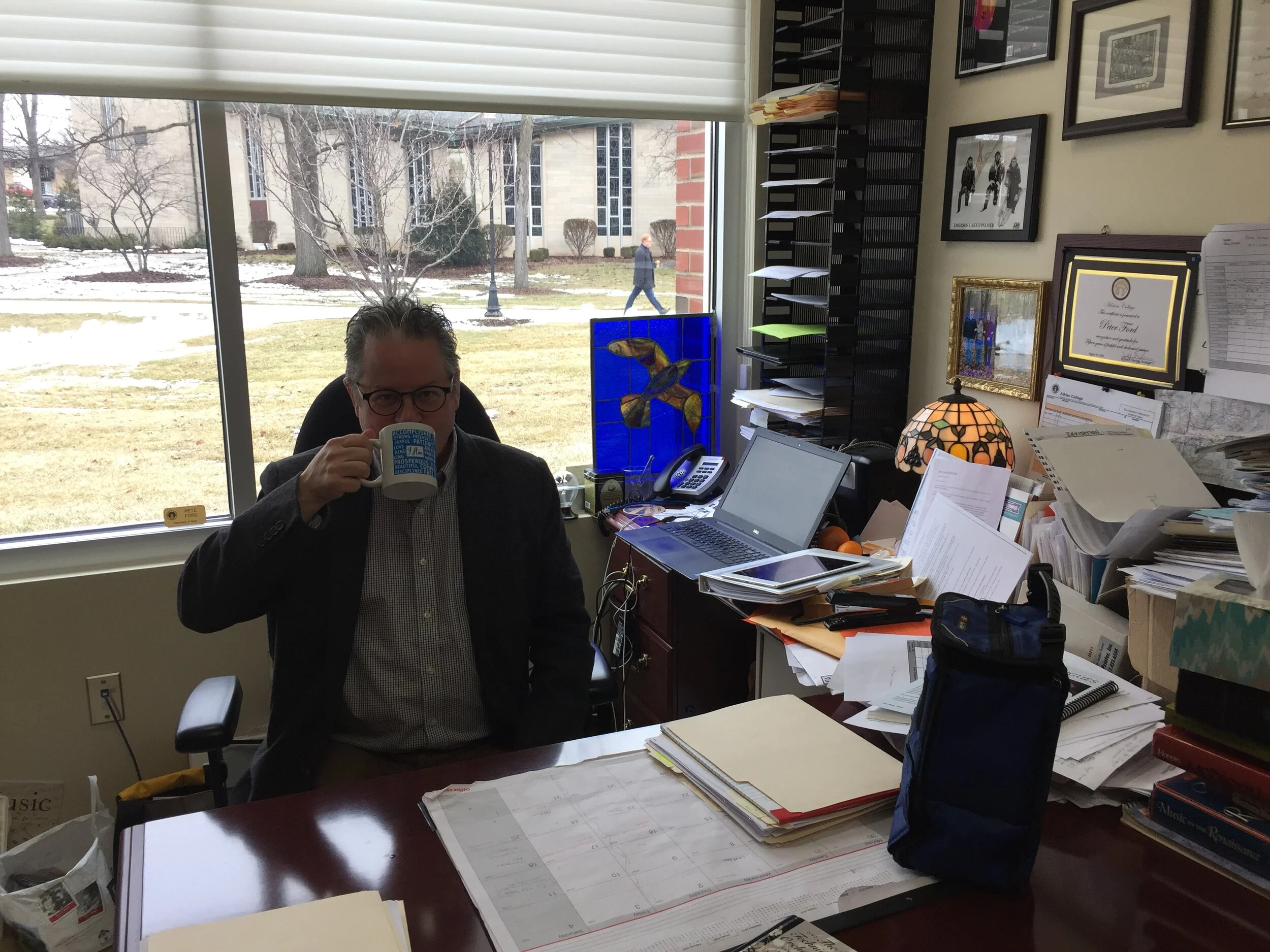
Full Professor, Music Theory, Adrian College
Adrian College, Adrian MI
Professor Ford has taught at Adrian College for over eighteen years, and as of Fall 2022 he is proud to have earned the official status of Full Professor. Courses taught include music theory, aural skills, applied composition, applied beginning piano, applied jazz piano, and “Chamber Jazz” combo.
One of my music theory students Natalie Kolano interviewed me in spring 2021 for a short class film project, and her interview segment, which is something with which I cannot help but be delighted, is at this youtube link: https://youtu.be/iEK5FCNxIpQ
In spring 2022 my Adrian College student Katie Hamann, a Music Education major, gave an informative twenty-minute “Ribbons of Excellence” lecture/performance regarding the minor pentatonic scale in jazz improvisation. I was honored to be both her mentor and her jazz accompanist on the project. Please enjoy her presentation here: https://youtu.be/9sljiSlS8xM
The following link is another feature of the same student Katie Hamann is performing one of my compositions in recital in November 2022:
Adrian College “Chamber Jazz” Combo following a performance in September 2022. This class emphasizes improvisation and overall practical gigging skills.
A view of my office space at Adrian College
Examples of Professor Ford’s Teaching.
Regarding the Augmented 6th Chord and its three geographical labels
“Italian Augmented 6th” (It.+6), “French Augmented 6th” (Fr.+6), and “German Augmented 6th” (Gr.+6),
Professor Ford provided an off-the-cuff video for his students a few years back, and it has over 18,000 views as of June 2020:
Secondary Dominant chords are another subject that Professor Ford breaks down for his students in a different off-the-cuff lecture:
Occasionally, when my fingers’ stamina allows, I will teach some basic jazz concepts on the guitar:
This piece performed by guitarist Chris Buzzelli on YouTube at:
In fall 2018, one of my Music Theory classes at Adrian College was learning about the construction of JS Bach's 2-Part Inventions.
Sometimes the best way to learn and understand is to do, and theory and composition go hand in hand. So as a class (composing by committee with a fair amount of Socratic dialogue), students Ryan Boyle, Gabe Witt, Noah Kittle, and Jenna Palmer worked at the chalkboard together to come up with the motive (two bars in 6/8 meter here) and countermotive (the top voice in mm. 3 and 4). Seeing potential for expansion of the fruits of their efforts into a more complete musical piece that could be put through sequences to cadence in its relative major, explore other closely-related keys in brief a developmental section (including the use of a dominant pedal tone) and recapitulate to the opening idea in the tonic key, and seeing the opportunity for this to work on a solo classical guitar, I completed this piece as a guitar arrangement the same day (September 17, 2018). In Bach's style, the primary motive and countermotive are engaged in a dialogue of overlapping ideas, sometimes with the melody on the high strings and sometimes on the low strings, often with melodies dovetailing as they elide. Normally this sort of composition is played on a keyboard instrument between right hand and left hand. But because of the key (A minor), I was able to make this musical concept work pretty well on a solo acoustic guitar. Students had also arranged this brief invention for other instruments (tuba and oboe, if I recall), and even performed their version informally in an instrumental studio class. Fast-forward to summer 2021, going through old boxes of nostalgia in my office, I found this little gem of a handwritten score. I scanned it and sent it to Chris Buzzelli, retired guitar professor at BGSU (Bowling Green State University in Ohio), and he was kind enough to record a video of him artfully reading through it for me. So enjoy!
(I have also composed fifteen of my own additional two-part inventions in Bach’s style for Keyboard since this first class effort.)
Summer 2020, during the pandemic, Professor Ford was invited to give a guest video lecture on music theory from a jazz perspective to graduate music students at the University of Michigan.
One U of M student’s feedback to their professor:
“ I recently started playing Jazz…in a local big band, so I super appreciated this [lecture]. The band is full of seasoned pros, and being…mostly classical…it has definitely been a big step out of my comfort zone... I enjoyed how much [Professor Ford] stressed not playing the same thing all the time and the importance of always mixing and matching in some element (direction, rhythm, melodic contour, etc)… I also liked how he took us through the use of EVERY note when he explained certain scales so thorough!"
In January 2023, Professor Ford will be a presenter at the Michigan Music Conference in Grand Rapids MI. More details will be forthcoming.

“If a cluttered desk is the sign of a cluttered mind, of what, then, is an empty desk a sign?”
—Albert Einstein



